In early March of 2022, a weird little pirate show permanently changed my brain chemistry. I was one of the folks who watched Season One in real time. When the first three episodes dropped, I went, “Oh, this is fun! Jokes, am I right? And how good does Taika Waititi look in that outfit?” When the next batch of three dropped and That Bathtub Scene happened, I immediately opened AO3 to see if anyone else was seeing what I was seeing. (Not many people were. Not yet. But a handful!) When episodes seven and eight dropped (the “Oh my God, this is happening” scene! the absolute perfection that is the sequence with “The Chain”!), I became a feral monster of a person. I was also sick with Covid for the first time, so with nothing but canceled plans and a mountain of tissues in my immediate future, I had way too much time to play Fleetwood Mac’s Rumours on repeat while wondering whether or not I was being queerbaited yet again.
(Look, it was possible. Back in the day I was, against all reason, a Sherlock fan.)
(No, I know. Trust me. You don’t have to tell me. I know.)
Then episodes nine and ten of Season One dropped and… well, not to overstate it or anything, but I do think they’re among the best episodes of television I’ve ever seen.
All of which is to say: I went into Season Two of Our Flag Means Death with very, very high expectations.
Not just me, either. By the time Season Two finally aired, legions of fellow queers from all over the internet had joined in, all of us theorizing and debating and making Season Two bingo cards. All of us three parts excited and one part nervous about where the show would take us next.
In its first half, Season Two surpassed all of my wildest expectations. It commits wholeheartedly to exploring the dark turn that Ed “Blackbeard” Teach took at the end of Season One, and it doubles down both on its offbeat sense of humor and on its centering of queer found family. We get disaster lesbians and Zheng Yi Sao and messages in bottles and Buttons becoming a seagull! And that reunion! Look, we always knew “Gentleman Pirate” Stede Bonnet would find his way back to Ed, the love of his life—but I don’t think any single one of us was prepared for how it would end up happening. (Underwater dream sequence? Check. Rhys Darby in a mermaid tail? Check. Kate Bush soundtrack for maximum glorious melodrama? Check.)
The second half of Season Two, however, is where things get a little shaky. Don’t get me wrong; there’s a lot that I love in those last few episodes. There are far, far more things I love than things I don’t. And most of the things that I don’t love could easily have been fixed if the creative team had more screen time to work with. Emotional beats that felt skipped over, important conversations that we have to assume happened offscreen, that sort of thing. Some of the cast and creative team have talked about how intense the rewrites were, especially in the last three episodes of the season. We’ve seen some stills, as well as footage that didn’t make it into the final cut, suggesting that a lot of interesting material ended up on the cutting room floor. The what and why and how much of all this editing remains the subject of extensive speculation among fans, but we do know that the writers were working within tighter parameters than before. Season Two as a whole was two episodes shorter than its predecessor, and individual episodes averaged significantly shorter run times than their Season One equivalents.
However, there’s one thing that I don’t think more time within the season could easily have fixed. I’m talking, of course, about the source of the biggest schism in the entire Our Flag fandom: the death of Ed’s first mate, Izzy Hands.
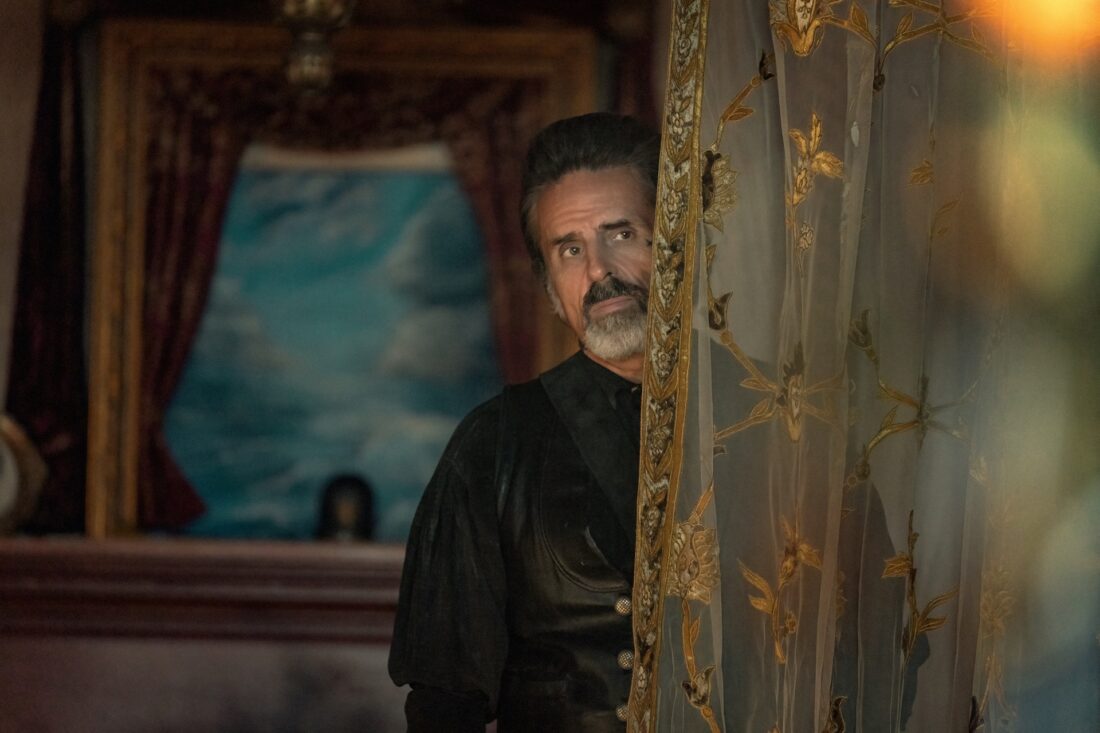
Like many other fans, I spent a lot of Season One seeing Izzy as a one-note villain. At the beginning of the show, he’s old-school to a fault. A grimdark archetype in a sea of Muppets. A real pirate’s pirate. His swordsmanship is impeccable, his masculinity toxic, his demeanor grim. He’s a thorn in the side of Ed’s desire to move beyond his “Blackbeard” worksona, and then of Ed’s nascent romance with Stede. It was only Con O’Neill’s stellar acting skills that kept me from wanting to throw my TV out the window every time Izzy was on my screen.
But then I saw the Season One finale, in which Ed begins to heal from the pain of Stede’s abandonment—to embrace softness and vulnerability even without Stede there to encourage him. Izzy can’t stand it; he calls Ed a “namby-pamby in a silk gown, pining for his boyfriend,” he calls Ed’s transformation “a fate worse than death,” and he tells Ed that he’d “better watch his fucking step.” And instead of swatting Izzy away like an annoying gnat—or, you know, tossing him off the side of the ship—Ed listens. He hears Izzy saying that being soft and open and vulnerable is dangerous, so he closes himself off again, hiding behind leather and booze and a painted-on beard. He hears Izzy’s threat and threatens him right back; after cutting off Izzy’s toe and forcing him to eat it, he says, “Threaten me again, and I’ll feed you the rest.”
That infamous Toe Scene was when Izzy became three-dimensional to me. It was something about what his face does as Ed makes him eat his own toe. Something about the breathless eagerness in his voice as he agrees to find Ed later and receive his new orders. Something about the horrifying intimacy of that moment made me want to go back and watch every previous Izzy scene (especially the Ed-and-Izzy scenes) just to see what I’d missed.
What I’d missed was a whole lot of subtext, both physical and in dialogue, that points toward a far more complex relationship than the one I’d seen at first glance. Toward two men whose lives, careers, and even personalities have been so mutually entangled for such a long time that letting crucial parts of themselves be amputated (for Izzy, the first of what would become several toes; for Ed, his humanity) feels easier than figuring out how to peacefully go their separate ways.
I became fascinated. I spent hours on AO3 during the long wait for Season Two, sifting through hundreds of pre-canon Ed & Izzy (and Ed/Izzy) offerings—and always gravitating toward the ones with tags like “Unhealthy Relationship” and “Unrequited Love” and “Two Men Who Make Each Other Worse.”
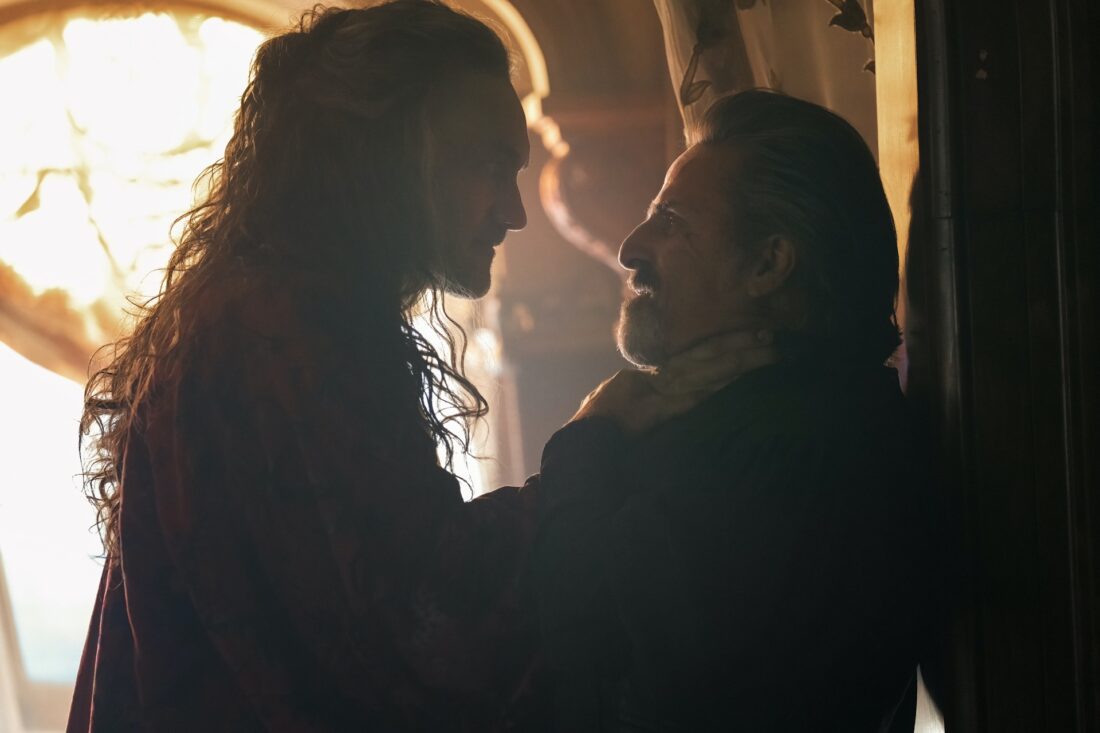
But as fascinating as their relationship is, Our Flag Means Death is ultimately a show about the relationship between Ed Teach and Stede Bonnet: two men who, as they fall in love, make each other better. And for each of them, becoming their best and truest selves means shedding the relationships that are no longer serving them. In the Season One finale, Stede says goodbye for the final time not just to his ex-wife Mary, but also to the stuffy, pampered, comp-het version of himself that his marriage to Mary was arranged to support. It would logically follow that in Season Two, Ed would have to say goodbye to Izzy—and, by extension, to the version of himself that Izzy expected him to be.
The big difference here is that Mary wanted Stede to leave. She built an amazing life for herself after he left the first time, and we can only assume her life gets even better when he leaves the second time. Izzy, by contrast, spends all of Season One proving that he isn’t about to give Ed-as-Blackbeard up without a fight. He clings so tightly that I was left with the strong sense that the only way Ed would ever truly be free of Izzy was if one of them died. Season 1 leaves Izzy Hands halfway through a villain arc that seems almost certain to end in death.
When we first meet Izzy again in Season Two, he’s become a card-carrying member of the Leopards Eating People’s Faces Party. Sure, back at the end of Season One, he wanted Ed to be the “real” Blackbeard again—to be cruel and callous, drowning all his better impulses in alcohol and drugs—but not this much. He wanted Ed to eschew wearing soft fabrics and exploring his artistic side in favor of ruling the seas and the crew with an iron fist—but not, like, this much of an iron fist. It becomes clear, in those first few Season Two episodes, that in fixating both on Ed and on his own position as Blackbeard’s First Mate, Izzy has accidentally built a prison not just for Ed, but for himself as well. He confronts Ed about how far things have gone; Ed, incensed at being criticized by the very person who pushed him to these extremes in the first place, shoots Izzy in the leg for his trouble, then orders him killed.
We all know what happens next. When the crew hides Izzy belowdecks and amputates his injured leg instead of killing him, Ed finds out, hands Izzy a gun, and all but orders him to take a shot—and when it’s later revealed that there were at least two bullets in the gun, it becomes impossible not to conclude that Ed didn’t intend for either of them to survive the encounter.
Survive they do, though, against all odds. Izzy refuses to shoot Ed (“Clean up your own fuckin’ mess,” he says), but when he attempts to shoot himself instead, he misses. Ed, meanwhile, sails his ship directly into a deadly storm, removes the wheel, then goads the crew into killing him; he only survives because Stede Bonnet literally brings him back from death with the power of love.
Despite their survival, though, the show seems to invite us to see these back-to-back suicide attempts—one temporarily successful, one not—as the events that finally free these two men from one another.
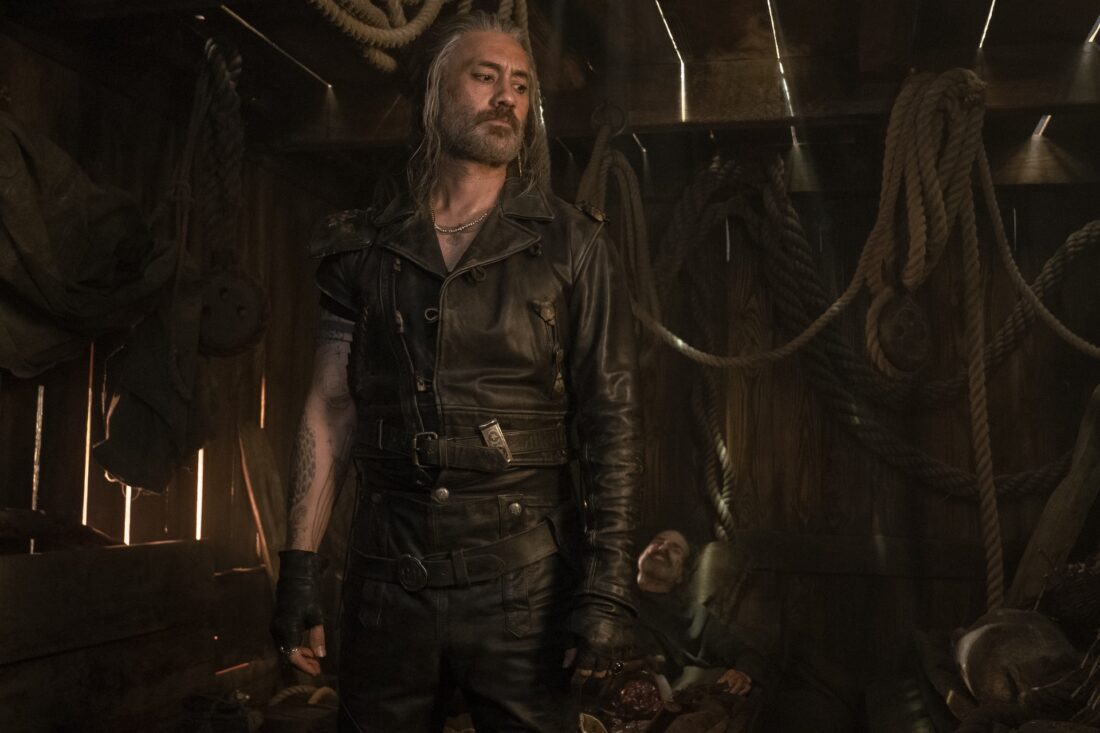
It’s not an easy freedom—at least, not at first. They’re left adrift. Ed, still mushy-brained from being dead and still incandescently angry at Stede for leaving him, is banished from the ship… until Stede invites him to come back and try making amends. Izzy, newly demoted and newly disabled, wallows in alcohol-soaked misery… until the crew fashions him a prosthetic leg from the hoof of the ship’s unicorn figurehead. And in their reactions to these two offerings of mercy and community, we see both men truly hopeful for the first time all season. We see potential futures for each of them. Potential happy endings.
After this midseason turning point, Ed’s Season Two arc largely centers on exploration of the place that “Blackbeard” occupies in his life; it culminates with Ed finding a useful-but-not-all-consuming space for that part of his identity, then retiring from piracy to open an inn with Stede. I dearly wish Max had given the creators more space to let Ed’s arc breathe—there are so many beats that seem to have been skipped over for the sake of episode length—but I found it pretty satisfying overall.
But, back to Izzy. The unicorn leg, along with everything it symbolizes, triggers a near-instant transformation for him. He begins bonding with the crew as a relative equal, instead of constantly trying to position himself as a superior. He gets to know Stede as an actual person, where before he’d only ever seen him as a threat. After Ed and Stede sleep together for the first time, Izzy teases Ed about it—but gently, in a way that feels friendly instead of threatening. Perhaps most memorably, he shows up to a party in drag-inspired makeup, complete with lipstick and rouge and glittery eye shadow under high-arched brows, and serenades the crew with “La vie en rose.” The English version and the French. He finally finds a way to make his queerness, which spent all of Season One cloaked in layers of self-loathing and performative masculinity, feel joyful. Even celebratory.
Season One Izzy sells Stede out to the cops the English navy because he’s afraid of, among other things, losing his status as Blackbeard’s First Mate. Season Two Izzy calls the latest cop equivalent a “rancid, syphilitic cunt” right to his face.
During a speech about how piracy isn’t about glory, but about community.
And then he sails off into the sunset with the community he’s finally accepted as his own, and we feel confident they’ll all live happily ever after.
Wait, no. The other thing.
And then he gets shot during a battle with the English. The crew helps him back to the ship, where there’s some talk of trying to save him even though it’s obviously too late. He bleeds out in Ed’s arms.
But. Like. Why?
I have a few theories about how Izzy’s death came about, and what story purpose it was supposed to serve. Here are the problems with all of them.
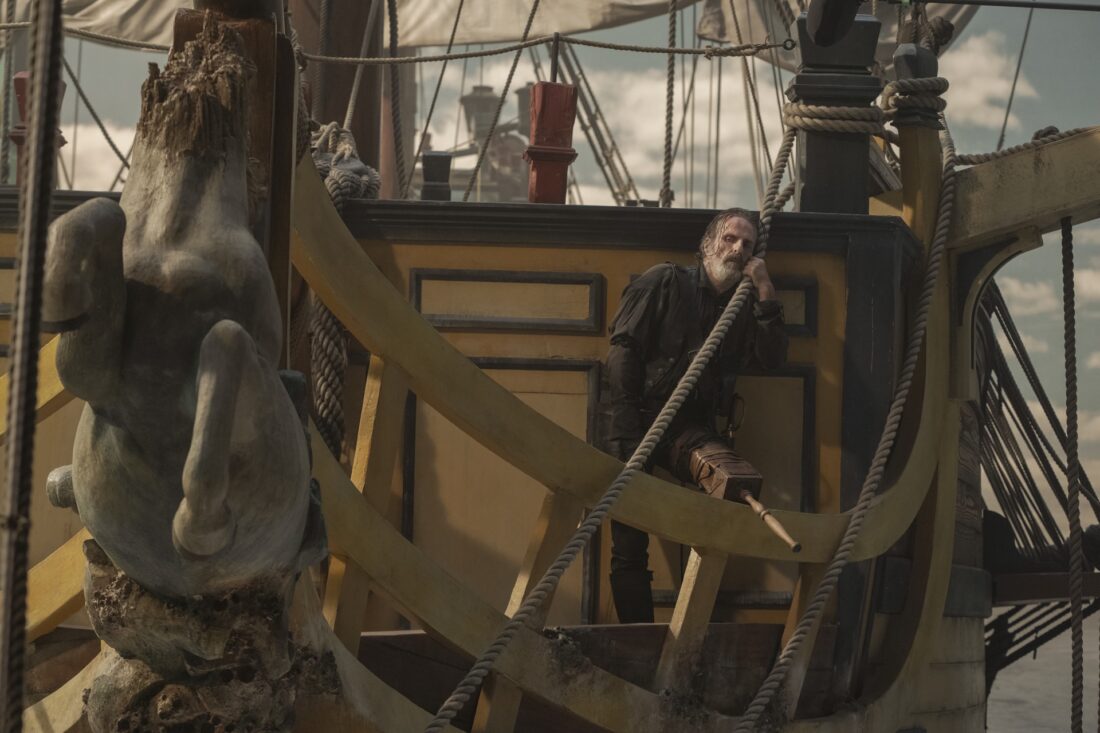
Theory One: The show’s creator and writing team decided ahead of time that Izzy would die at the end of Season Two, but everyone in the writers’ room ended up liking his character (and his brilliant actor, Con O’Neill) so much that they wanted to give him a few big joyful moments before he went. This is pure speculation; Season 2 scripts haven’t been made public, and nowhere have any of the writers explicitly said anything to this effect. But it doesn’t feel like a stretch to assume I wasn’t the only one who finished Season 1 with a strong sense that Izzy, like many villains before him, would eventually have to die. It also doesn’t feel like a stretch to assume that Izzy was as popular among the show’s writers as he was, and still is, among its fans.
Problem One: In order for those big joyful moments to feel organic, a redemption arc needed to happen. And in creating his redemption arc, the writers pointed Izzy firmly toward happily-ever-after (or at least hopefully-ever-after) territory. For whatever reason, though, they wouldn’t, or couldn’t, change the ending they’d already decided on. Which resulted in a truly baffling tonal mismatch between setup and payoff.
Theory Two: The creative team decided ahead of time that Izzy would die, and the original plan was for the death to happen not at the end of the season, but near the beginning. Maybe Izzy wasn’t originally going to survive the amputation of his leg, or maybe he wasn’t originally going to miss when he turned Ed’s gun on himself. But the writers liked him (and Con O’Neill) so much that they wanted to postpone his death long enough that he could have a few big joyful moments, and eventually die happy and surrounded by friends instead of dying miserable and alone.
Problem Two: Same as Problem One, but with a key addition! I think this could have worked if the death-postponement had been made textual in some way, like an Our Flag equivalent of The Bullet in Hamilton. The idea that a character might avoid a sad death in order to attain a happier one is appealing, but only in a context where some kind of imminent death is, itself, a foregone conclusion. In this context, where letting Izzy live absolutely was an option, it’s far less appealing.
Theory Three: Izzy dies in order to show the audience that piracy is very dangerous and often has lethal consequences—or that when violence is in the air, Anyone Can Die, even your favs. Like Wash in Serenity or Haldir in The Two Towers, Izzy dies not because it makes sense for his own character, but instead to add gravitas to the story and give the other characters an excuse to feel some feelings.
Problem Three: Our Flag Means Death isn’t that kind of show. In fact, I’d venture to say it’s the opposite of that kind of show. This is a show where Ed Teach comes back from the dead just because someone loves him enough for some magic to happen. It’s a show that punishes Stede Bonnet’s twin childhood bullies by killing them off in twin freak accidents. It’s a show in which a guy becomes a bird just to illustrate that it’s always possible for people to change. Izzy dying randomly isn’t at all in keeping with the tone of the show. Plus, since when do any of the characters on this show need excuses to feel their feelings?
Theory Four: Izzy died not to facilitate others having feelings, but to bring his own feelings to the surface. The only way he was ever going to apologize for the part he played in Ed’s pre-resurrection downfall was if he was literally on his deathbed. The writers wanted that apology to happen, and so? Deathbed.
Problem Four: Look, I absolutely love Izzy’s deathbed apology. “I fed your darkness” is such a succinct and beautiful line; he understands what he did, and he genuinely seems to regret it. And since Ed made his own (brief, terrible, perfectly in-character) apology two episodes earlier, things do seem unbalanced between them by the finale. However, given all the growth that Izzy experienced throughout Season Two, I absolutely do not buy that bringing him to the brink of death was the only way to make that apology happen. In fact, I think it might have been even more interesting to see the writers push Izzy to a place where he wanted to (or at least felt it was necessary to) apologize as a form of making peace, or seeking closure, without staring down his own imminent death.
Theory Five: Izzy’s death is supposed to be a symbol for the death of the “old ways” of piracy.
Problem Five: Izzy is absolutely an old-ways guy in Season One, but his redemption arc in Season Two changes that. Killing Season One Izzy for this reason would have made perfect sense; killing Season Two Izzy does not. Besides, the destruction of the Republic of Pirates already fulfills this symbolic function, with Nina Simone’s gorgeous cover of “The Times They Are A-Changin’” underscoring its point.
Theory Six: Izzy was Ed’s father figure, and father figures (both in genre fiction generally, and for Ed Teach specifically) have to die.
Problem Six: I’m only including this one because the show’s creator has mentioned, in at least a handful of interviews, that he thought of Izzy as a “sort of father figure” by the end of Season Two. Personally, regardless of his and the other writers’ intentions, I don’t see anything in the final version of the season that supports either this theory or this reading of Izzy’s character.
Theory Seven: Izzy, the sidekick, died so that Ed, the protagonist, could live.
Problem Seven: This only works if these characters are still so entangled that neither has a chance at happiness while the other is still alive. But by the time Izzy dies, both he and Ed are on their separate paths to happiness. Ed living happily ever after and Izzy surviving are not at all mutually exclusive.
Theory Eight: We are not actually supposed to understand Ed and Izzy’s back-to-back suicide attempts as the turning point that frees them from one another. After Ed comes back from the dead and Izzy becomes the ship’s “new unicorn,” we’re supposed to feel that they’re still too codependent, and they can never healthily go their separate ways. Therefore, yes, Izzy did have to die in order for Ed to live.
Problem Eight: There’s one thing that supports this theory: the fact that Izzy’s “La vie en rose” is the accompaniment to Ed and Stede’s fade-to-black sex scene. Much as I love the song and Con O’Neill’s rendition of it, I do feel that including Izzy’s voice in a scene where Ed and Stede are about to rip each other’s clothes off was a deeply weird move. (My entire kingdom for a recut of that scene featuring Patti Smith’s “Because the Night,” which was used in a Season 2 trailer, but sadly never in the show itself.) That said, I think it’s the only thing that supports this theory. Every other Izzy-and-Ed moment after that midseason turning point actively contradicts it.
Theory Nine: Izzy died so that the crew could live. In his season finale speech to Prince Ricky, Izzy claims that piracy is “about finding the family to kill for when yours are long dead. It’s about letting go of ego for something larger: the crew.” Family you’re willing to kill for is one step away from being family that you’re willing to die for.
Problem Nine: I think this also could have worked well if it had been made textual. At the end of Season One, Izzy was willing to maroon most of Stede’s crew, essentially leaving them to die, to save his own ego. An inversion of that in Season Two—for example, Izzy intentionally jumping in front of a bullet to save another crew member’s life—would have honestly been lovely. But this is so far from textual that it isn’t even a proper theory; it’s just wishful thinking.
And finally…
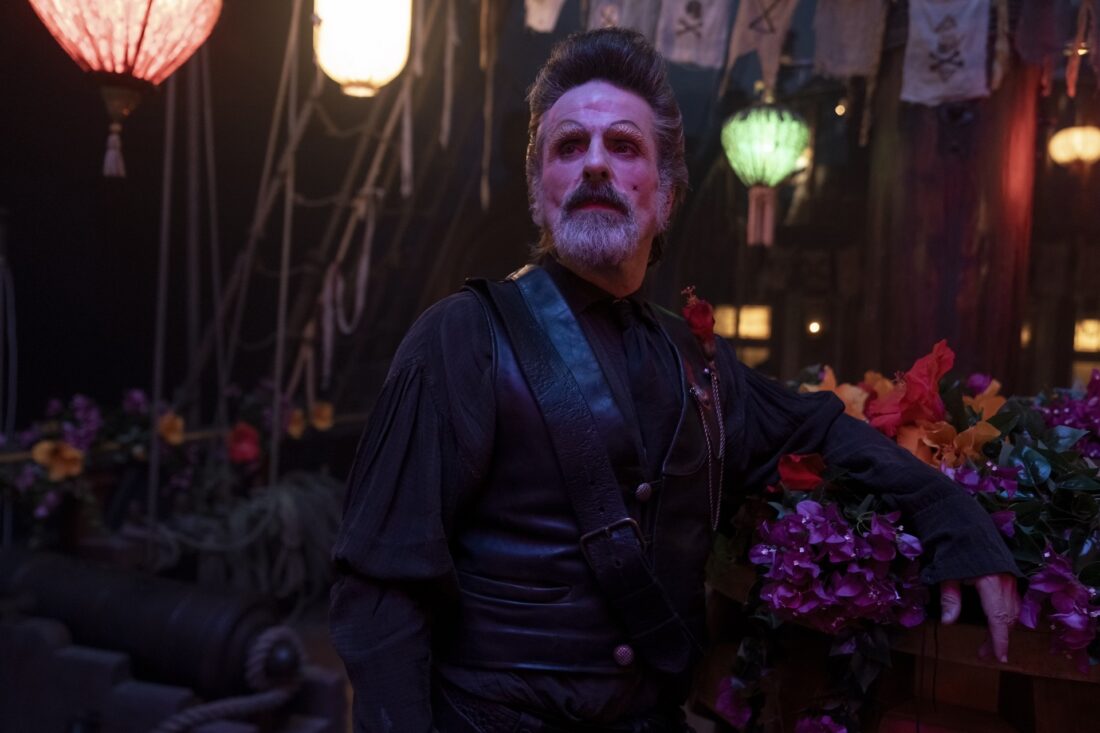
Theory Ten: Izzy’s death wasn’t supposed to be the end of his arc, but the midpoint. After all, his death does come at the hands of Prince Ricky, someone Izzy personally insulted only a few scenes earlier. Ricky survives the season, which means there are loose threads begging to be tied up. If the show hadn’t been canceled before its time, we might have gotten Season Three flashbacks that retroactively contextualized Izzy’s death a bit better. We might have gotten a situation where Izzy somehow took his revenge on Ricky from beyond the grave. We might even have gotten a resurrection; between Ed’s resurrection setting the precedent and Our Flag’s creator tweeting that “there’s no version of this show that doesn’t include Izzy Hands” on the day the finale aired, anything was possible.
Problem Ten: For obvious reasons, I can’t prove or disprove this one. Unless the show gets magically un-cancelled, or another network decides to pick it up somewhere down the line, we’ll probably never know how the story was going to end.
Did this article begin as a vehicle for me to complain about the cancellation of Our Flag Means Death? No, believe it or not. Was it always, in hindsight, going to end up being that anyway? Well… probably yes.
The silver lining to all this—both Izzy’s strange death and Max’s cancellation of the show—is that the legions of fans are still out there, making art and writing fan fiction and creating community. So if you’ll excuse me, I’m just going to tab over to AO3 again and read yet another post-canon fanfic in which Izzy never died at all.










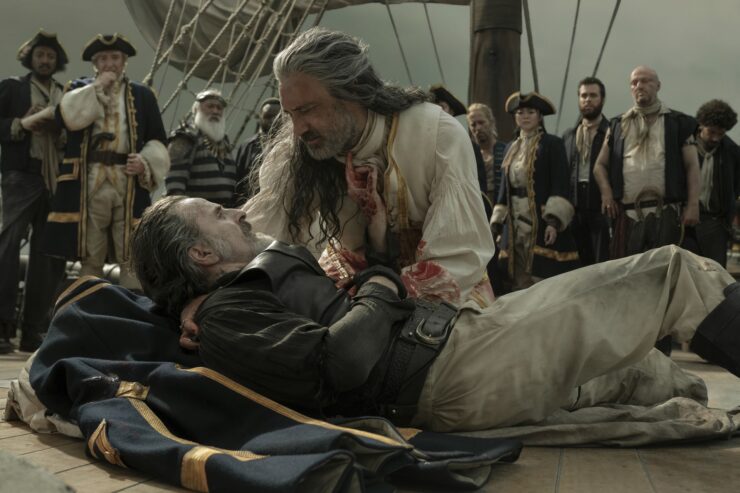
Hello fello OFMD fan! I agree with a lot of what you said here, but when it comes to Izzy.’s fate..I feel like you’re taking your own feelings as evidence to the point that it undermines the very thing you’re trying to do (make sense of what happened).
Me, I’d say the reasoning behind Izzy’s death that makes the most sense to me is a combo of theories 4 and 6, which have unconvincing Problem sections:
Theory 4: “…I absolutely do not buy that bringing him to the brink of death was the only way to make that apology happen. In fact, I think it might have been even more interesting to see…”
That’s a personal reaction (your own understanding of the plausibility of something), followed by a false absolute (it wasn’t necessarily the only way, but it was an effective and dramatic way) followed by another theory (I agree that might even have been better, but they barely had time for what we saw, let alone anything else).
Theory Six: “Personally, regardless of his and the other writers’ intentions, I don’t see anything in the final version of the season that supports either this theory or this reading of Izzy’s character.”
This is entirely your personal feelings–and a common thing I’ve seen from people who spend a lot of time on AO3 (no criticism meant, love AO3 and the fanfic community! But I’ve observed a LOT of people who spent a lot of time there in between seasons, and came into S2 with very different expectations than those of us who didn’t develop our character understandings through fanfic).
I get that you didn’t read the relationship like this, but there’s tons of stuff in the text to support this reading of Izzy’s character, particularly in S2. Most compelling to me is the big scene in the S1 finale, when the physical arrangement of Ed and Izzy (and the emotional content) echoes the scene of Ed watching his father beat his mother. You can interpret that romantically, but I’d argue it’s much more about shaping Ed into the Kraken aspect of his personality, something that goes right back in a straight line to his own father and Izzy (the two people in the show Ed hurts explicitly as “the kraken”). Izzy’s control of Ed can certainly be read as paternal, and Izzy’s manipulations of Ed are painfully familiar to people who’ve had emotionally abusive relationships with both parents and romantic partners. The final scene between Ed and Izzy is very much casting Izzy in a paternal role, in a way that inverts the Ed-Izzy scenes at the end of the previous season, Izzy forcing Ed into being something else vs. Izzy freeing Ed to be himself. What Izzy says to Ed there, I’d argue, is in many ways the dream of many children of bad parents: “What you became because of me wasn’t your fault, the way I treated you was about ME, not about you, and the thing that would make me happiest in the world is if you just be yourself.”
I get that what I’ve offered here is an interpretation, just like yours, how I *personally* see the relationship. But your argument was that there is no evidence to support the other interpretation, and that’s just not accurate. Both interpretations are valid and have textual support.
Fuck theory 10 woulda been cool though. Maybe they’ll integrate something like that into the movie (which I very much hope happens at some point in the next decade or so, C’MON WAITITI PLEASE)
There’s transformation themes in every character’s arc. A story giving you some feelings you didn’t like feeling is not an indictment of it’s quality. Weird article.
As always, we ask that you keep the discussion civil and constructive, and avoid being rude or dismissive–the full moderation policy can be found here: https://reactormag.com/moderation-policy/
I think Izzy typifies a greater issue in television, that the writers often think once they’ve brought lovers together, they then have to separate them again to try and have the same frisson, rather than trusting that they can write conflict within a relationship.
So Izzy is there as a crowbar in Season One, so that people don’t go “oh they got together that’s the story finished then”. In Season Two it’s harder to justify why people would follow or tolerate Izzy, particularly in an environment where it would be so easy for him to be shot, stabbed, tipped overboard, so he has to go through that redemption arc to keep the character in the story. But what are the story options for the character, really? He would have to go away and then pop up again later in a new context where distance allows a different relationship, but in the show it’s not clear that he can step away from Ed.
Honestly, the more I think of Izzy’s death as a narrative choice, the worse it seems. It just doesn’t make any sense: his character arc was in the opposite direction, and the tone and themes of the show also don’t support that. Unless, of course, the writers wanted to give him an ironic arc – but that is just cruel, and I don’t think they would do that, having the audience the show has. I, as a disabled queer person with no choice but stay in the closet for the forseeable future, saw much of myself in Izzy, and his arc in season two felt cathartic. His death felt like a betrayal, at best. Both being closeted and being disabled are very isolating, so stories like his – and stories, in general – are all I have. His arc in season two gave me hope, and that hope was yanked away with the laziest of the writing choices. I’ve felt actual grief, and I know that is justified.
Because the alternatives are “it was a dumb narrative choice” and “it was a cruel narrative choice” I think he didn’t really die – it was a fuckery to give Ed and Izzy himself some closure (again?) -, or he would have come back somehow – the seagull landing on his grave at the end made me suspicious of that. Or maybe it’s just wishful thinking because I’m still grieving. Whatever.
Anyway, this was a great read! Thanks for sharing it.
I agree that Izzy’s death felt off in a show that hit the nail on the head in so many ways, wrapping up quicker-than-anticipated and undercutting so many tired tropes with material that felt really fresh. Theory 3 is the one that felt closest to me but still just seemed unnecessary after they’d taken so much time to build a character arc that was honestly willing to grapple with the kind of trauma that can turn someone vile, address it and create a forgiveness arc. Izzy was … done? Well, bah, why not let him have more! Especially as you point out, it’s not really that kind of show in any other instance.
Still won’t stop me from rewatching and I’m totally including this season 3 headcanon from now on! Great article.
The final scene shows a seagull land on Izzy’s marker. I took this to maybe be Buttons, and if Buttons can become a seagull, surely Izzy can be resurrected.